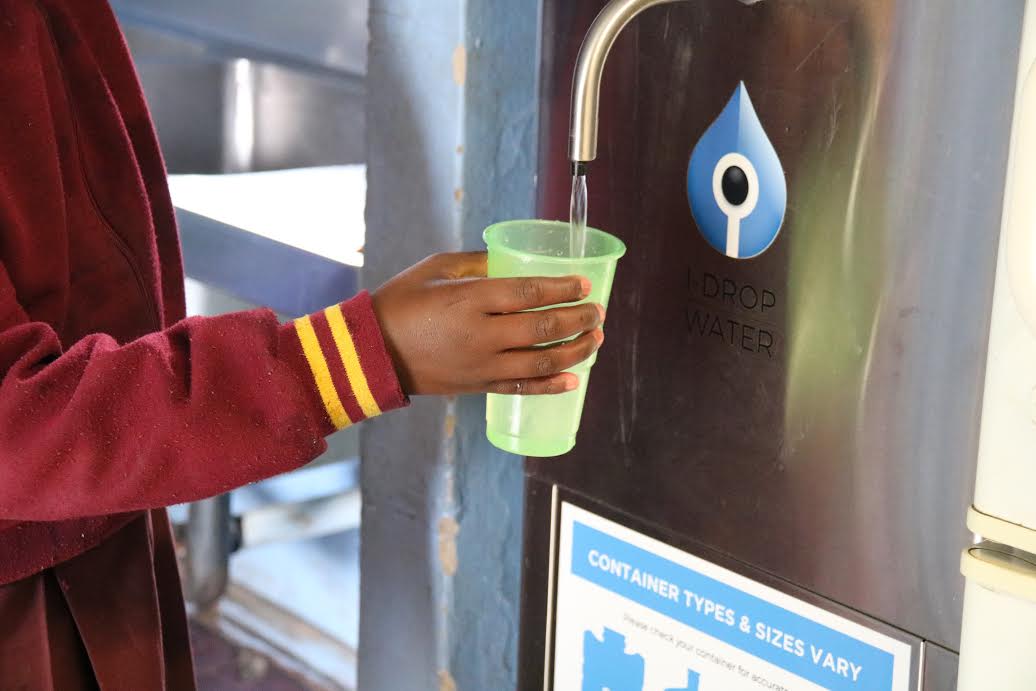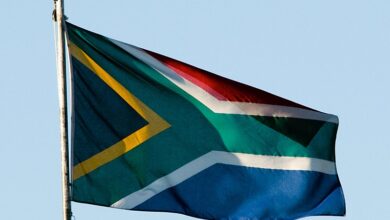
For Petunia Mohale, safe drinking water was not a given.
After discovering rust inside the pipes at her home in South Africa, Mohale was hesitant to drink the tap water.
According to a 2015 report from the World Health Organization, 1.8 billion people around the world drink from a water source contaminated with feces. Mohale was one of approximately 300 million people in Africa who do not have access to safe drinking water.
So when a sales representative for I-Drop Water approached her about installing a water purification system at her tuck shop in Soweto, Mohale agreed.
“People don’t have a choice between this really stark alternative of either risking your health by drinking unsafe water or finding a way to pay for incredibly expensive bottled water which is environmentally devastating and just really inefficient,” said James Steere, co-founder of I-Drop Water.
Steere and Kate Thiers Steere founded I-Drop Water as an alternative solution to make safe drinking water affordable and accessible for people like Mohale in South Africa and the African continent.
Since its founding in 2015, I-Drop has partnered with grocery store owners in four African countries (South Africa, Zimbabwe, Botswana and Ghana) to install over 60 filtration systems and has already sold over half a million liters of safe drinking water.
I-Drop purification systems can be installed in any grocery store with access to a running tap, at no cost to the shop owner. Customers can then purchase safe drinking water for just 1 South African rand per liter – approximately 80% cheaper than bottled water. At the end of each month, I-Drop splits the profit from water sales evenly with the shop owner.
“It’s a price point low enough for just about anyone to afford and it’s incredibly efficient,” Steere said of the I-Drop business model.
“We’ve removed these capital cost barriers by making [the filtration system] free for any grocery store to install in their shop and start selling.”
In the months after installing the machine, Mohale sold around five bottles of filtered water a day, with more on the weekends. She encourages customers to buy I-Drop water, despite their initial reluctance. At first customers thought it was just tap water and not safe like bottled water, she said.
But the I-Drop filtration system is just as effective, and more cost-efficient, than the bottled water industry because of three major components: the filter itself, cellular networks and environmental sustainability.
The I-Drop system’s water filter, which is manufactured in the United States, uses a nanocarbon configuration to filter out viruses, bacteria, and cysts – anything that is carbon based and could make someone sick – while retaining the water’s minerals.
“The filter produces no waste water. It’s a simple configuration of water that comes in contaminated comes out the other side clean and that’s essential because there’s a lot of water constraint,” Steere said.
Though the filter is efficient, effective and requires minimal oversight, Thiers Steere is able to monitor each machine remotely by using Global System for Mobile communication (GSM) technology which connects each machine to the I-Drop platform.
“I’m the data nerd. I’m the one who manages the whole platform and I’m the one that diagnoses problems. The amount you can tell from the information we get is incredible,” Thiers Steere said.
While an I-Drop technician is available to repair the machine should it malfunction, Thiers Steere is typically able to address any technical problems remotely via the machine’s cellular-based platform and the data she receives from it.
As such, the personal oversight by I-Drop over each machine is limited to a filter change every six to eight months. But even then, storeowners can be trained to replace the filters themselves.
“There are hardly any places in Africa that don’t have decent [cell] coverage. And because we’ve designed our system so that it can run on solar power completely, it can run a pump on solar power, it can run electronic communication on solar,” Steere said.
While solar power is one of I-Drop’s environmental benefits, the project also reduces plastic consumption. Consumers bring their own container or purchase a reusable container instead of buying individual water bottles.
Ultimately, I-Drop aims to be an environmentally-friendly, affordable alternative to the bottled water industry and a practical solution to deteriorating water infrastructure.
“The massive investment needed by the government to make all the water for people safe to drink is unrealistic,” Steere said.
According to the South African Institute of Civil Engineering’s Infrastructure Report Card 2011, the replacement value of the water resources infrastructure was 139 billion South African rand.
“Instead, why not treat drinking water as a food. If you can bring the price down to a point that everyone can afford it and you use existing channels [grocery stores] to get it to them, you’ve addressed that specific issue,” Steere said.
Yet, Steere and Thiers Steere acknowledge that 1 rand per liter is still unaffordable for some people.
“We want to be part of the drinking water solution. We need to tackle this challenge using business, and our business model enables that,” Steere said.
As a for-profit business venture, I-Drop hopes to subsidize the cost of installing filtration systems by sales revenue generated from local storeowners. They have already installed a machine at Bapedi Primary School in Soweto, which allows the students and staff to drink safe water for free.
Steere and Thiers Steere believe in the eventual scalability of I-Drop throughout Africa and elsewhere. But in the meantime, their focus is first growing the South African market around Johannesburg and the Eastern Cape.
This article was originally published in City Press and shared by Egypt Independent as part of our participation in Impact Journalism Day on which 50 of the world’s leading newspapers feature 60 social innovators who come up with innovative, beneficial solutions for better access to health and education, respect for the environment, good nutrition, sustainable energy.






